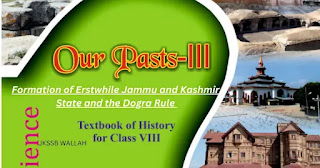FORMATION OF ERSTWHILE JAMMU &
KASHMIR STATE AND THE DOGRA RULE
Table of Content
Textual Exercise
Q 1. Match the Column:
|
Civil and Criminal code of law |
|
State Council |
|
Land Alienation Regulation of 1933 |
|
Regularised the Shali system |
Answer.
|
Regularised the Shali system |
|
Civil and Criminal code of law |
|
State Council |
|
Land Alienation Regulation of 1933 |
Q 2. Fill in the blanks:
a. Maharaja Gulab Singh formed the State of Jammu and Kashmir.
b. The Establishment of Raghunath Pathshala and Library
was done by Maharaja Ranbir Singh.
C. Begaar was the most inhuman practice where the
peasants were forced to work without wages.
d. Walter Lawrence was appointed as The Revenue
Settlement Commissioner of Kashmir In 1989.
e. Maharaja Hari Singh passed regulations against untouchability and threw open the doors of temples for
the lower castes.
Q3. State Whether True or False:
a. Residency was established during the reign of Maharaja Ranbir Singh.
Answer. True
b. Dar-Ul-Terjumah was the finance department of the state.
Answer. False
c. Gurmat Kanya Pathshala was the first girl’s school in The
Jammu Region.
Answer. True
d. The Agriculturalists Relief Regulations was passed in 1926 Ad.
Answer. True
Q 4. Answer the following questions:
a). Discuss the role of Maharaja Ranbir Singh in the field of education?
Answer. Maharaja Ranbir Singh played a significant role in the field of education with the following initiatives:
i) He encouraged Hindu-Muslim scholarship by establishing the Translation Bureau known as Dar-ul-Terjumah. This bureau translated Arabic and Persian works on philosophy and history into Sanskrit, Hindi, and Dogri.
ii) He established institutions like the Raghunath Temple Pathshala, a library, and a Mahavidyalaya to promote education. He believed in providing education for all classes of his subjects and founded several state-sponsored institutions.
iii) The Dogra court under his patronage supported and promoted all languages and scripts.
b). Briefly describe the steps taken by Maharaja Hari Singh to ameliorate the position of women in the state?
Answer. Maharaja Hari Singh took the following steps to improve the status of women in the state:
i) Established the Dhanvantri Memorial Trust, which provided financial assistance to girls during their marriage.
ii) Enacted the Infant Marriage Prevention Regulation Act in 1928 AD to combat child marriage.
iii) Introduced the Widow Remarriage Act and Property Regulation in 1931 AD, granting widows the freedom to marry and lead their lives according to their own choices.
c). Write a short note on the cultural development in Jammu during the Dogra period with special reference to theatre and drama?
Answer. The cultural development in the Jammu region during the Dogra period, with a special focus on theatre and drama, includes the following aspects:
i) The establishment of the first native performing group, Raghunath Theatrical Company, situated within the premises of Raghunath Temple.
ii) The formation of Dogri Sanstha in 1943 (AD), which played a crucial role in promoting Dogra culture and introducing original Dogri plays such as Baba Jitto, Sarpanch, Nama Gran, and more.
iii) The Jammu region witnessed the emergence of vibrant regional folk theaters like Tamachra, Bhagtain, and Haran during the 19th and 20th centuries. These folk theaters added to the richness of the local cultural scene.
d) Highlight the major public welfare work s under taken during the Dogra period in Jammu and Kashmir.
Answer. During the Dogra period in Jammu and Kashmir, the major public welfare works undertaken were as follows:
i) Establishment of local self-government: The regency established in 1885 brought about a change in governance, leading to increased representation for the people and rising national consciousness.
ii) Roads and railways: Extensive construction of roads and railways connected the state to the outside world, fostering trade and commerce.
iii) Irrigation projects: Several irrigation projects were initiated to combat frequent famines in the region.
iv) Public healthcare: Modern medical facilities were introduced during the later period of Dogra rule, improving the state’s healthcare system.

